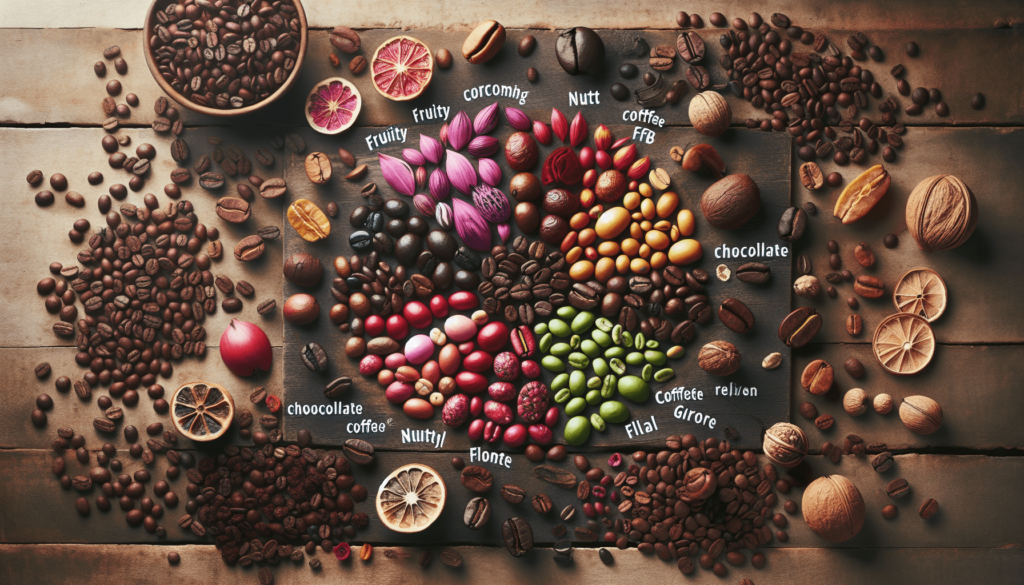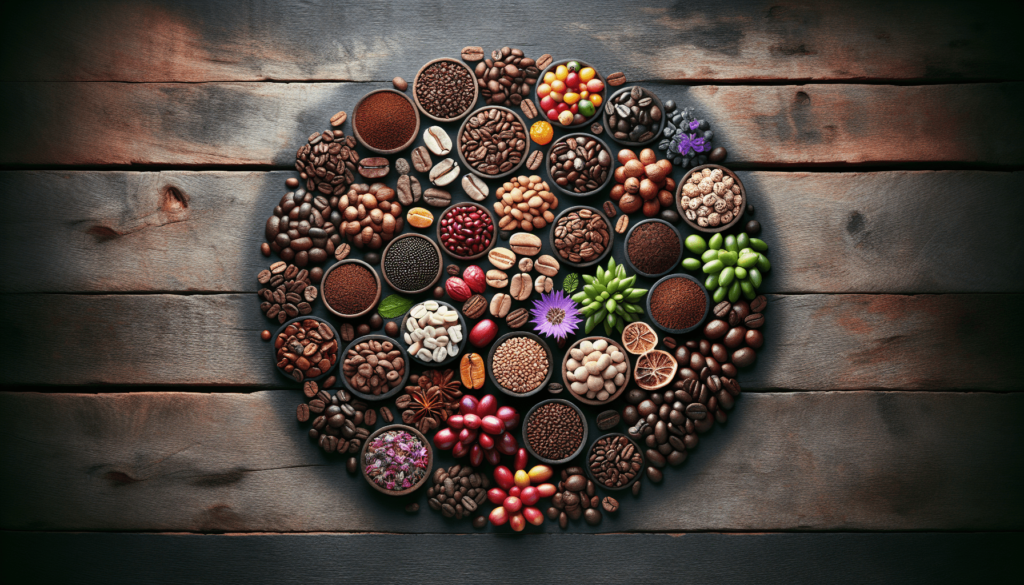Do you ever wonder why different coffee beans can taste so uniquely distinct? Coffee is more than just a daily dose of caffeine; it’s a sensory journey, offering a range of diverse flavors that can captivate your taste buds. The world of coffee is vast, and understanding its flavor profiles can significantly enhance your appreciation for this beloved beverage. So, what are the 4 main coffee flavor profiles, and how can you identify them?

Understanding Coffee Flavour Profiles
Every cup of coffee tells a story—from the type of bean and its origin to the roasting process and brewing technique. Grasping the basics of coffee flavor profiles can elevate your coffee experience from ordinary to extraordinary. There are four primary coffee flavor profiles to acquaint yourself with: fruity, floral, nutty/chocolaty, and earthy/spicy.
The Importance of Coffee Flavor Profiles
Understanding coffee flavor profiles is not just for coffee aficionados; it’s for anyone who wants to enjoy their cup even more. Knowing what flavor profile you prefer helps in selecting beans or blends that will most likely appeal to you. It can also guide you in brewing methods that best bring out those qualities.
Fruity Coffee Flavour Profile
The fruity flavor profile is one of the most intriguing and diverse. Coffees with a fruity profile are often bright, tangy, and vibrant, offering a delightful range of citrus, berry, and tropical fruit notes.
Common Fruity Flavors
Here are some common flavors associated with fruity coffee:
| Flavor | Description |
|---|---|
| Citrus | Lemon, orange, and grapefruit undertones add a zesty character |
| Berry | Strawberry, raspberry, and blueberry hints provide a sweet, tangy experience |
| Tropical | Mango, pineapple, and passion fruit create an exotic and refreshing taste |
Origin and Processing
Fruity coffees are often found in beans from Ethiopia, Kenya, and other African regions. These coffees usually undergo a washed or natural processing method that maintains their bright and clean fruitiness. The beans are often light roasted to preserve their delicate flavors.
Best Brewing Methods for Fruity Coffee
Using a pour-over or Aeropress can accentuate the fruity notes in your coffee. These methods provide precise control over the brewing parameters, ensuring that the fruitiness shines through in your cup.
Floral Coffee Flavour Profile
The floral flavor profile is characterized by subtle, aromatic notes that resemble blooming flowers. This profile is delicate and often associated with high-quality, specialty coffees.
Common Floral Flavors
Here are some floral flavors commonly found in coffee:
| Flavor | Description |
|---|---|
| Jasmine | Perfumed, tea-like quality that’s light and airy |
| Lavender | Aromatic and soothing, reminiscent of sweet lavender |
| Rose | Soft, sweet undertones with a slightly perfumed aroma |
Origin and Processing
Floral coffees are predominantly sourced from Ethiopian and Yemen regions. The beans are often naturally processed to maintain these gentle, aromatic flavors. These coffees are usually light to medium roasted to uphold their elegant floral notes.
Best Brewing Methods for Floral Coffee
A Chemex or siphon brewing method works well with floral coffees. These methods emphasize clarity and brightness, allowing the nuanced floral notes to be more prominent.
Nutty/Chocolaty Coffee Flavour Profile
For those who prefer a richer, more indulgent cup, the nutty/chocolaty flavor profile is a treat. These flavors are comforting and familiar, making them a favorite for many.
Common Nutty/Chocolaty Flavors
Here are some flavors you might enjoy in this profile:
| Flavor | Description |
|---|---|
| Almond | Subtle, sweet, and buttery |
| Hazelnut | Rich, warm, and slightly sweet |
| Milk Chocolate | Smooth, creamy, and sweet |
| Dark Chocolate | Deep, bittersweet, and robust |
Origin and Processing
Beans from Latin America, particularly from Brazil, Columbia, and Costa Rica, are known for these flavors. The coffee cherries are often wet-processed, which enhances the nutty and chocolaty characteristics. These beans usually undergo a medium roast to develop their full-bodied flavors.
Best Brewing Methods for Nutty/Chocolaty Coffee
An espresso machine or a French press can highlight the rich, creamy textures and flavors of nutty/chocolaty coffees. These methods magnify the body and depth of the brew, making every sip delightful.

Earthy/Spicy Coffee Flavour Profile
The earthy/spicy flavor profile is robust and complex, offering a rich tapestry of flavors that can include everything from wood and tobacco to pepper and clove.
Common Earthy/Spicy Flavors
Here are the prominent flavors in this profile:
| Flavor | Description |
|---|---|
| Tobacco | Rich, deep, and slightly sweet |
| Cedar | Woody and fragrant |
| Pepper | Spicy and sharp |
| Cinnamon | Warm and aromatic |
Origin and Processing
Southeast Asian countries like Sumatra and Java in Indonesia are known for producing beans with strong earthy and spicy notes. These coffees often go through a semi-washed or wet-hulled processing method that emphasizes their robust flavors. They generally receive a medium to dark roast to bring out their intense and complex characteristics.
Best Brewing Methods for Earthy/Spicy Coffee
The French press or espresso methods work exceptionally well with earthy/spicy beans. These brewing techniques extract the full range of flavors, giving you a rich, intense cup that’s both satisfying and intriguing.
How to Identify Coffee Flavour Profiles
Recognizing these flavor profiles may seem daunting at first, but with practice, you can train your palate to differentiate between them. Start by focusing on aroma, body, acidity, and aftertaste:
-
Aroma: Close your eyes and take a deep whiff of the brewed coffee. What initial scents do you pick up?
-
Body: Take a sip and notice the texture of the coffee in your mouth. Is it light and airy or heavy and syrupy?
-
Acidity: Focus on the sharpness or brightness you sense. Does it remind you of citrus fruits, or is it more subdued and smooth?
-
Aftertaste: Pay attention to the lingering flavors after you swallow. Do any specific flavors stand out?
Experiment and Discover
There is no right or wrong answer when it comes to coffee flavors; it’s all about personal preference. By exploring these profiles, you can find what resonates most with your palate. Whether you enjoy the vibrant fruitiness of an Ethiopian Yirgacheffe or the deep, chocolaty richness of a Brazilian Santos, understanding flavor profiles can transform your coffee-drinking experience.
Practical Tips for Developing Your Palate
-
Keep a Coffee Journal: Take notes on the different flavors you taste in various coffees. This practice sharpens your ability to detect subtle differences.
-
Taste with Others: Enjoy coffee with friends or join a local tasting group. Sharing experiences can lead to new discoveries.
-
Learn Brewing Methods: Different brewing techniques can alter the flavor profile of a coffee. Experimenting with methods like pour-over, French press, and espresso can help you appreciate the nuances in taste.
Conclusion
Understanding the four primary coffee flavor profiles—fruity, floral, nutty/chocolaty, and earthy/spicy—can significantly enrich your coffee experience. Each profile offers a unique journey through a landscape of flavors, influenced by origin, processing methods, and roasting techniques. By paying attention to aroma, body, acidity, and aftertaste, you can develop a sophisticated palate that will help you identify and appreciate these flavors. So why not embark on this flavorful adventure and discover which coffee profile truly speaks to you?
